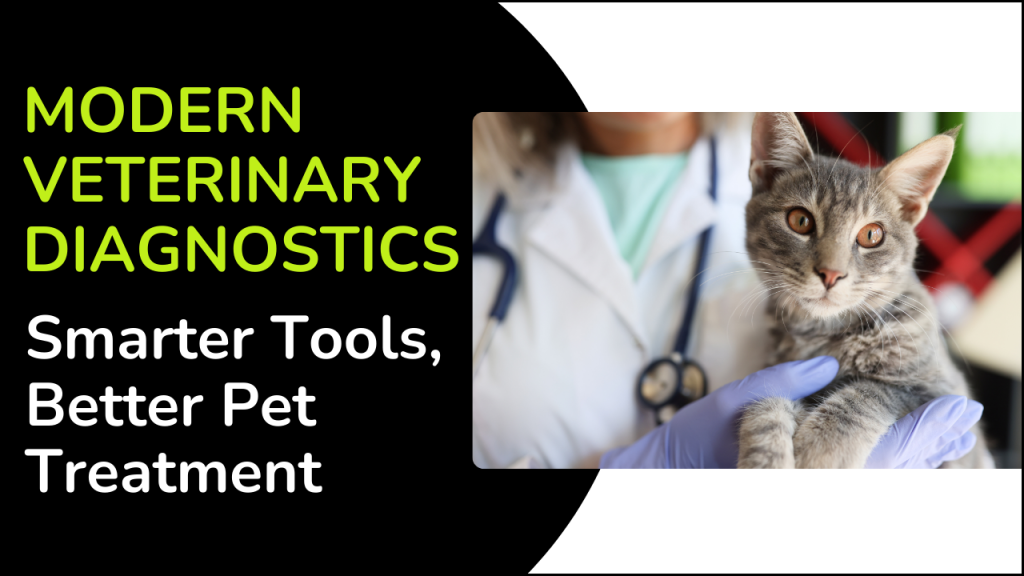
In the United States, two out of every three households have a pet — that’s about 87 million homes. What’s more, nearly all pet owners (97%) see their pets as part of the family. As a result, veterinary clinics are busier than ever, working hard to provide quality care for our furry friends. But this growing demand is creating real pressure on veterinarians and clinic staff.
Veterinarians face long hours, high emotional stress, and rising expectations from pet owners. At the same time, clinics are often short-staffed and trying to do more with less. This has led to burnout among many professionals, costing the U.S. economy up to $2 billion every year. The need for better support, smarter tools, and faster results has never been greater.
Thankfully, modern technologies are stepping in to help.
Table of Contents
Smart Diagnostics at the Clinic
One of the biggest changes in veterinary care is the rise of advanced point-of-care diagnostics. In simple terms, this means clinics can now use smart, portable machines to quickly run tests right on-site — no need to wait days for results from a faraway lab.
For example, Vetscan Imagyst® by Zoetis is a powerful tool that uses artificial intelligence (AI) to analyze test samples quickly and accurately. It weighs just over 8 pounds, making it easy to move around the clinic. Another tool, AlphaTrak® 3, helps monitor blood sugar levels in diabetic pets and can even be used by pet owners at home.
Together with Zoetis Virtual Laboratory, these devices are helping clinics save time, get answers faster, and make better decisions for pets. These tools aren’t just gadgets—they’re becoming trusted partners for vets and pet parents alike.
Virtual Care Is Here to Stay
During the COVID-19 pandemic, we all got used to doing things virtually—from doctor visits to workout classes. Veterinary care was no different. The crisis pushed clinics to try virtual consultations, and surprisingly, they worked well.
Now, vets can connect with pet owners over video calls, saving time and making care more convenient. But it doesn’t stop there. With services like Zoetis’ Virtual Laboratory, veterinarians can also get support from specialist consultants and pathologists—anytime, anywhere.
This means that even if a vet is unsure about a complex case, help is just a Zoom call or an email away. Whether you’re a new graduate or a seasoned vet, having a second opinion or expert review available at your fingertips is a game-changer. It builds confidence, speeds up diagnoses, and improves care quality.
The Rise of Artificial Intelligence in Vet Clinics
AI isn’t just something we see in sci-fi movies—it’s already being used in animal healthcare. AI can look at X-rays, blood tests, and other medical images to help find problems faster and more accurately.
In the past, AI systems were limited. They could only recognize patterns based on pre-programmed data. But now, with deep learning AI, things have changed. These systems can “learn” from thousands of real-world examples. They can recognize tiny parasites, bacteria, or even crystals in urine—things that might take a human much longer to spot.
This new kind of AI doesn’t need every single rule programmed in. Instead, it finds patterns by itself, helping vets make better decisions in a shorter time. It’s like having a super-smart assistant that never gets tired and learns from every case it sees.
Bringing the Lab Into the Clinic
One of the most exciting changes is that advanced diagnostic testing can now be done directly inside the clinic. No more sending samples out and waiting days. With tools like Vetscan Imagyst, clinics can quickly run multiple types of tests: fecal exams, blood smears, dermatology checks, urine tests, and even equine (horse) fecal egg counts.
These tools use AI to provide fast, accurate results. They can also flag unusual results that might need expert review. This not only speeds up care but also ensures that pets get the right treatment without delay.
Still, not everyone is ready to trust AI just yet. Some worry about whether the results are reliable. That’s why companies like Zoetis must take the time to properly train their AI systems. They use thousands of real samples reviewed by board-certified experts to make sure the AI is as accurate and helpful as possible.
Why This Matters for the Future
The veterinary market is growing fast. In the U.S., it’s expected to reach nearly $19 billion by 2033, with a growth rate of over 10% each year. That’s great news, but it also means even more pressure on clinics and staff.
To keep up, clinics need to work smarter, not harder. They need tools that can save time, improve accuracy, and reduce stress. That’s where technology comes in. When used correctly, it can help reduce burnout, improve patient outcomes, and even boost job satisfaction for the people working in the field.
The goal isn’t to replace vets or staff with machines—it’s to support them, help them work more efficiently, and give them more time to do what they do best: care for animals.
Final Thoughts
Veterinary care is changing fast, and the future looks promising. New technologies—from AI diagnostics to virtual support systems—are making life easier for clinics and better for pets. Tools like the Vetscan Imagyst and the Virtual Laboratory by Zoetis are leading the way, showing how technology and human care can go hand in hand.
In a world where pets are family, every tool that helps vets do their job better is a step in the right direction. By embracing innovation, we can help solve today’s challenges and build a healthier future for animals and the people who care for them.





